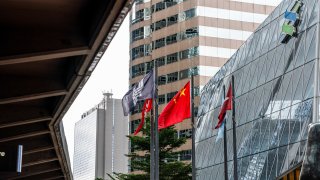
- Greater China stock indexes led losses as Covid concerns resurge, while Asia-Pacific markets traded lower on Wednesday.
- U.S. stock indexes initially fell sharply on Tuesday stateside before rallying in the afternoon.
- In central bank news, Bank Negara Malaysia raised rates by 25 basis points on Wednesday.
SINGAPORE — Greater China stock indexes led losses as Covid concerns resurfaced, while Asia-Pacific markets traded lower on Wednesday. Oil futures rose after plunging overnight.
Hong Kong's Hang Seng index slipped more than 2% earlier in the session and was down 1.22% at 21,586.66 at the close, with heavyweight CNOOC falling 4.81%. British bank HSBC's shares in Hong Kong also fell 3.54% after the Bank of England increased its countercyclical capital buffer rate from 1% to 2%.
Mainland China markets also declined. The Shanghai Composite shed 1.43% to close at 3,355.35, and the Shenzhen Component lost 1.25% to 12,811.33.
329 medal events. 32 sports. Endless drama. Catch all the action at the Paris Olympics. Sign up for our free Olympics Headlines newsletter.
"New rounds of Covid testing in Shanghai have increased fears of further lockdowns for China, which would have a ripple effect on other markets," an ANZ Research note dated Wednesday said.
Shanghai will be conducting mass testing in several districts after Covid cases were detected earlier this week, a statement on the city's WeChat account said.
Some 11 cities in China were restricting local movement as of Monday, up from five cities a week earlier, according to Ting Lu, chief China economist at Nomura.
Money Report
Japan's Nikkei 225 fell 1.2% to26,107.65 and the Topix index slipped 1.23% to1,855.97.
In South Korea, the Kospi declined 2.13% to 2,292.01, and the Kosdaq lost 0.84% to 744.63.
The S&P/ASX 200 in Australia was 0.52% lower at 6,594.5.
MSCI's broadest index of Asia-Pacific shares outside Japan was down 1.14%.
U.S. stock indexes initially fell sharply on Tuesday stateside before rallying in the afternoon. The Nasdaq Composite ended the session 1.75% higher at 11,322.24, while the S&P 500 was up 0.16% at 3,831.39.
The Dow Jones Industrial Average shed 129.44 points, or 0.4%.
The U.S. 10-year Treasury yield and the 2-year yield inverted on Tuesday in the U.S., a closely watched measure that signals recession. Longer duration yields are usually higher than shorter duration yields. But the 2-year yield was last at 2.8059, slightly above the 10-year yield of 2.8017.
"There is no doubt that recession is the biggest issue markets are currently grappling with, both equity, fixed income and frankly commodity markets as well," Ben Snider, a senior strategist at Goldman Sachs, told CNBC's "Squawk Box Asia" on Wednesday.
In central bank news, Bank Negara Malaysia raised rates by 25 basis points on Wednesday.
Currencies and oil
The U.S. dollar index, which tracks the greenback against a basket of its peers, was last at 106.494, jumping from below 105.3 earlier this week.
The Japanese yen traded at 135.37 per dollar, strengthening from more than 136 against the greenback on Tuesday. The Australian dollar was at $0.6814 after falling against the stronger U.S. dollar.
"The deteriorating global economy is the main weight on AUD," Kristina Clifton, an economist at Commonwealth Bank of Australia wrote in a note Wednesday.
In Asia's afternoon trade, oil futures traded higher. West Texas Intermediate crude was up 1.42% at $100.91. Brent crude rose 1.97% to $104.79.
The U.S. oil benchmark plunged as much as 10%, breaking the $100 level on Tuesday stateside before settling 8.24% lower at $99.50 on the back of recession fears.
International benchmark Brent crude settled 9.45%, or $10.73, lower at $102.77 per barrel.
— CNBC's Evelyn Cheng contributed to this report.






